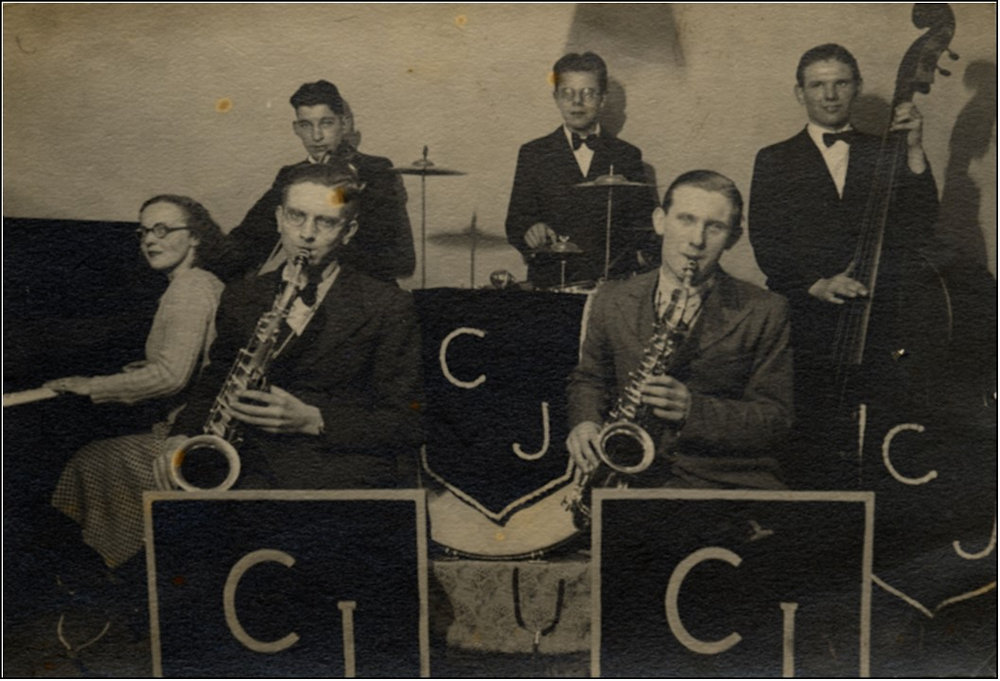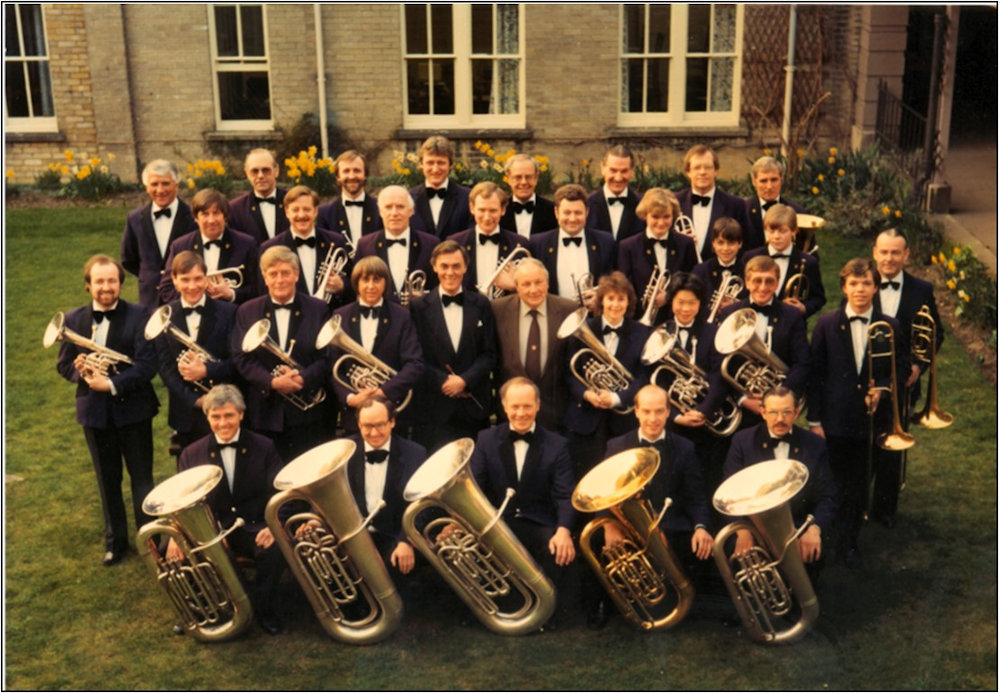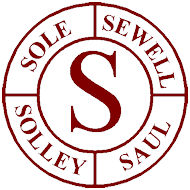By Fred Sole
This article was published in the August 2015 edition of Soul Search, the Journal of The Sole Society
Ed: Now this was a side to Fred I wasn’t aware of — his time in dance bands! Read on….
A musical world?
Ah, yes…, I was part of that scene…
Time passes and one forgets detail (sometimes complete happenings) then a casual remark, a surprise meeting with an old friend, or a flash of memory, brings some of it back – like Jack Edwards’s 70th birthday party, but I’ll get to that later.
I began playing a drum in the Army Cadet Force as I mentioned earlier. I found it very enjoyable but little guessed where it might lead. Shortly after the cadet band began, fellow workmate and army cadet drummer Norman Jones mentioned that his brother Cyril wanted to start a Dance Band. Cyril played Saxophone and Clarinet, Norman was learning Double Bass and three other players had been found. Would I play Drums?
Fortunately their parents had acquired a second-hand drum-kit as I could never have afforded such a thing. I had no idea how a dance-band drummer worked but I agreed to give it a try.
At the time, Dance Bands were the leading form of public entertainment due to the need to cater for the spare time of thousands of servicemen and other young people tasting new freedoms. We knew very little about what we were attempting but that didn’t dampen our enthusiasm. Rehearsals soon started, using (possibly illegal) re-arranged one shilling (5p) piano sheet music, in Mrs. Jones’s front room (that’s where the piano was) and somehow we acquired a microphone and an amplifier – 15 watts ! It was useless for anything other than announcements but, as we didn’t anticipate having a vocalist, we were ready for the road.

Our very first job was a Party/Dance at The Ram Inn, Whittlesey for the local Army Unit (Searchlights) and it was a great success. After that, we travelled all over a 25 mile radius of Whittlesey most weekends for over a year, sometimes taking Cyril’s family piano tied on to a trailer behind a local garage man’s taxi when the local village hall didn’t possess a playable one. The car was a 1939 Hillman Minx – into which five of us and the driver managed to squeeze. Paying for such luxurious transport didn’t leave much from the fee for the players!
From those early years two venues remain clear in my memory – Guyhirn (off the A47 between Thorney and Wisbech), and Knarr Cross. We made several visits to Guyhirn and their functions were always very good. The frequent visits made by the Army Cadet Band during the summer to their church Fetes and Gala must have helped, and we became almost members of villagers’ families.
The ‘Annual Grand Dance’ in that village hall had to seen to be believed. I don’t think I have ever been to, or played at, a better one. The lonely hamlet of Knarr Fen was not a good place to visit on a dark and stormy night after reading about ‘Black Shuck of the Fens’, but the annual dance made it worth every hair that the journey raised.
Activities commenced at 8pm, (though I suspect preparations began a good week before) and at 9pm proceedings were stopped for ‘Refreshments, Ladies and Gentlemen!’.
Copious quantities of excellent food and ale were provided (free of charge to the band) and my favourite memory is of sitting beside the very temporary and unstable bar with a pint of Elgoods ‘Best’ in one hand (at 16!) and two goose sandwiches in the other.
At 9.30pm refreshments formally ceased, although informally they carried on all evening, and the ‘Grand Auction For Village Funds’ began. The quantity and form of the items for sale were unusual even for those days and for a country venue – Potatoes, Cabbages, Carrots, Apples, Pears, home-made Cake, Pastries, Pies (meat and fruit), Jam, Marmalade and Wine, supplemented by Chickens, Geese, Ducks, Rabbits and even a live pig. The only thing missing was the ‘Ark’.
It all continued until about 11.45 but, as the Master of Ceremonies said, ‘We have plenty of time for the last Waltz’, so we had to leave the beer and sandwiches and find the music to play it. Heaven only knows what it sounded like!
No, (fortunately, some would say), you don’t see many like that any more.
Regrettably it had to stop when Army life intervened, but during the last year of my service I played with the unit dance band at the regular Friday night dances when the barracks was partly opened to the public. My experience was very limited of course but the other band members were very good and soon boosted my confidence. As demobilisation approached I shared the work with another drummer until my service ended in January 1948.
After demobilisation and starting work, a friend told me that the Ric Evans band of Peterborough needed a drummer. Would I be interested? I didn’t know Ric or anything about the band but yes, I was interested.
The band was small, consisting of Ric on Saxophone, Godfrey Faux on Trumpet, ‘Shep’ Shepperson on Piano and Don Wright on Double Bass. We were all keen and we played several jobs in the area without any serious mishaps. I was pleased to be back in the music world even though it had meant buying a drum-kit sooner than I expected. Help in that direction came from two quarters.
It was common for servicemen to set up an arrangement for part of their pay to be sent home to their next of kin and I sent Granny seven shillings each week, one third of my pay. She had said nothing but had put it all into a Post Office Savings Account for me and gave me the book when I said I was going to try to buy a drum kit. The money provided a good deposit and because I chose a brand new kit Mr. Treutlein the shop owner didn’t charge interest on the remainder. Fortune appeared to be smiling all the way.
It wasn’t long however before Ron Todd, a workmate who was also pianist with the Jack Edwards Band, told me that Jack was looking for a replacement drummer so that he could ‘front’ the band. At first I wasn’t too sure, because I knew that it was a bigger band than any I had played with before. Also, I knew that Jack himself had been percussionist with the Royal Norfolk Regimental Band but I said if Jack thought it OK I would try it for a couple of rehearsals. I stayed for over two years!
Those years were very happy ones. The atmosphere within the band was particularly ‘free’ in spite of the high playing standards.
My favourite venues, which we played on alternate Saturdays were the Wisbech Corn Exchange and the Boston Gliderdrome. Dances at those places always drew large crowds and ‘customers’ often stood closely packed in front of the stage enjoying the music.
The band also visited the Kings Lynn Corn Exchange occasionally and one night there we played opposite the great Ted Heath Orchestra. Opportunities like that didn’t occur often because Ted was Britain’s No.1, the equal of anything in America – and we were being paid to be there!!! I am sure we were the only Peterborough band to be able to make that claim.
During another job at Kings Lynn (or was it Wisbech, memory is vague here), a young male member of the crowd (well, it would be, wouldn’t it) drew attention to himself by climbing the internal iron framework of the hall. It was late in the evening and no doubt the local Elgoods brewery bore some liability for his doubtful bravery.
Seeing him halfway up the stanchion Jack called across the stage ‘Give him a roll, Fred’, so, in true circus fashion, I made sure everyone knew what was happening. He reached the top (where the cool evening breeze was most effective) and promptly fell the twenty feet or so to the floor, perfectly in time to the rimshot that ended my roll. Everyone thought his foolishness had proved fatal but, several jobs later, showing true Fenland spirit, he was back – on two crutches! It took a lot to keep them away from a good dance where there would always be attractive girls.
The world of music, however, is one of change and it was not surprising when in 1952 Derek Ingamells decided to form a band of his own based on the style of the successful Cyril Stapleton Orchestra to play his own arrangements.
I joined the new band and in 1953 the band entered the Eastern Area heat of the National Dance Band Championships organised by the musical paper The Melodymaker. The event was held at the Mansfield Hall, Peterborough and attracted several bands from Bedford, Lincoln, Northampton and Peterborough. Each band had to play a Quickstep, Slow Foxtrot and Waltz (of their own choice) and Derek chose to play ‘I get a kick out of you’, ‘With a song in my heart’ and ‘We won’t live in a castle’. We won the heat and I still have the 10inch shellac records that were made at the time. Due to the limited recording facilities at the venue (one microphone suspended centrally above the bands plus the vocalist microphone) they don’t sound quite the same as most of my other records but they are ‘live’ and they were made from one ‘take’. We didn’t follow it up to the London Final because we couldn’t afford the travel cost.

I left the band, (and music for a few years), when June and I married in 1953 (my life’s Best Day’s Work!) and my place was taken by Gerry Boyce. Later, I understand, the band expanded to a full brass section but the future of traditional dance bands (especially big ones) had been ‘Blowing in the Wind’ for some time.
Bookings were disappearing steadily. ‘D.J’s (disc jockeys) were proving cheaper and their records, mostly of the new ‘Rock & Roll’, were popular.
I never knew the final line-up of Derek’s band – I think it folded in 1955.
I moved to Evesham in Worcestershire with my Post Office work in 1959, and June and our daughter Christine followed in January 1960 when our house was finished.
In January 1969 I was obliged to move again due to major restructuring of the Post Office and we chose to move to the Peterborough Head Office. Christine travelled with me to June’s parent’s house to be ready for the start of school term and June, Martin and David followed in March when the house was available – 60 Lynton Road, Peterborough.
Almost immediately I was approached by ex Reg Walden saxophonist Tom Harris, who asked if I would play percussion with the Peterborough Territorial Army Military Band with which he played Oboe. The band had a personnel of mainly ex-regular Army musicians and I thus began another musical life, much different from the earlier one. I found it more demanding but just as enjoyable.
Time saw me gravitate from that discipline to theatre pit work, Brass Band music – contest and concert work – (with Nassington Brass and Stamford Town Band) and, in between, teaching part-time at Oundle School and Peterborough Technical College. I missed out on Classical Orchestral because there was no group of that kind within reasonable distance.
Until… during the 1990s failing hearing put a stop to it all and the stage curtain came down for the last time. Almost 50 years in music, and drums in particular.
HAPPY DAYS !!!

